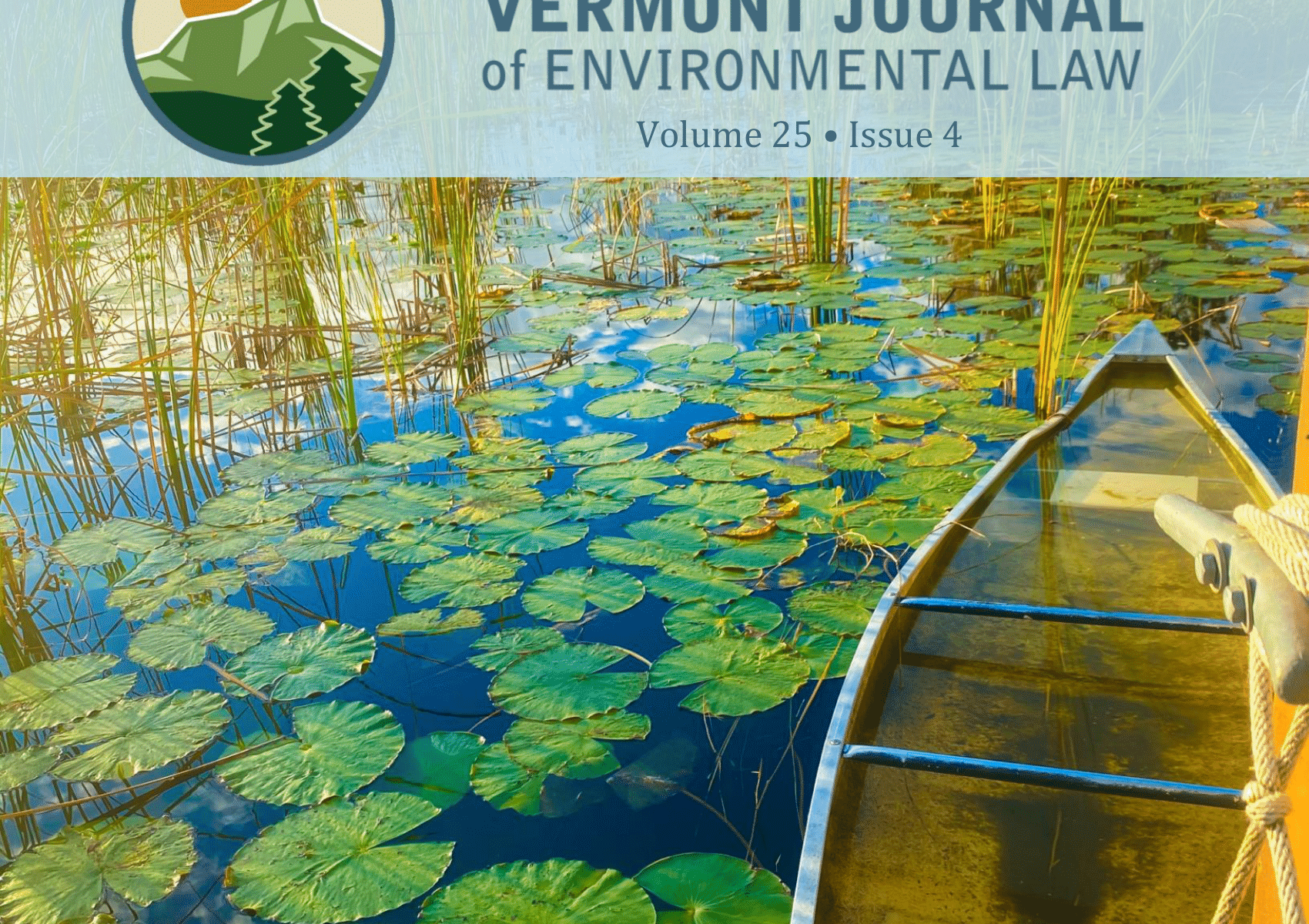
VJEL Newsroom
Published: Volume 25, Issue 4 of the Vermont Journal of Environmental Law
By VJEL
May 23, 2024
The Vermont Journal of Environmental Law (VJEL) is pleased to announce the publication of Volume 25, Issue 4. Issue 4 features two Articles and one Student Note. First, Keith Rizzardi examines the decline in water quality in Florida, attributing it largely to what the author terms “micro-deregulation.” It identifies various subtle forms of deregulation, such as the liberal use of exemptions and the discretion granted to agency decision-makers, as well as practical effects like budget cuts for water managers. The Article concludes by proposing comprehensive changes to Florida’s regulatory framework to address the worsening water quality issue. Next, Zhiyu Huang argues that while Chinese environmental law incorporates nature-based solutions for natural disaster preparedness and response, the current perception of disasters as force majeure events limits effectiveness. The Article suggests integrating scattering nature-based solutions into a more cohesive framework within China’s forthcoming “Ecological Environment Code,” emphasizing the need to reframe disasters as often human-induced as and proposing a systematic integration approach. Finally, Aashini Choksi addresses lead service line replacement efforts in Washington D.C., emphasizing the need for a clear, comprehensive policy to ensure equitable access to safe water across all neighborhoods. The Note outlines the prevalence of lead service lines in BIPOC and low-income areas, discusses ongoing replacement plans, and highlights the challenges faced by vulnerable communities in accessing these programs. Recommendations include banning partial replacements, diversifying funding sources, and creating opportunities for private funding through municipal bonds to prioritize vulnerable communities.
VJEL publishes exclusively online, and this Issue may be accessed on our website by clicking this link to view our Volume 25, Issue 4 Publication or accessing our Volume 25 Publications from the navigation header.
Articles:
Micro-Deregulation: Polluting Florida’s Water, Drop by Drop
By Keith W. Rizzardi
This Article surveys the diminution in Florida’s water quality, largely because of what the author describes as “micro-deregulation.” As the Article makes clear, some of these deregulatory efforts—like outright repeal of statutes or rules—are obvious, and some are less so. The Article focuses on these latter, more insidious forms of deregulation. “Open” deregulation, for example, includes the liberal use of exemptions, presumptions, and preemption to sidestep regulation altogether. “Hidden” deregulation, on the other hand, is exemplified by the vast discretion granted to agency decision-makers under Florida law. The Article describes “deregulation through blindness,” meanwhile, as the de facto deregulation that results when concepts like judicial restraint, standing doctrine, and fee-shifting provisions with respect to citizen suits serve to restrict potential plaintiffs’ willingness to seek redress in court. Finally, the Article briefly describes the practical deregulatory effects of shrinking budgets for water managers in Florida. Rizzardi concludes by recommending a series of comprehensive changes to Florida’s regulatory framework that would help address the state’s rapidly diminishing water quality.
By Zhiyu Huang
This Article asserts that, although Chinese environmental law contains various mechanisms for utilizing nature-based solutions to prepare for and respond to natural disasters, the current understanding of natural disasters as force majeure events has resulted in a framework that is discrete rather than comprehensive and that thereby fails to be optimally effective. The solution, Huang suggests, is for China to integrate these scattered aspects of its nature-based solutions for disaster risk reduction (“NbS-DRR”) into a more comprehensive scheme as the country drafts its “Ecological Environment Code.” The Article begins by surveying the global disaster-related landscape and overviews some of the more serious recent natural disasters in China. It goes on to reframe natural disasters as “unnatural”—often resulting from a combination of climate change and poor land management—and discusses the achievements and potential detriments with respect to some of the more massive ecological engineering projects China has undertaken over the past five decades. The Article continues by assessing the 42 pieces of Chinese environmental legislation that currently utilize NbS to respond to and mitigate disasters and describing the various shortcomings of this disparate approach to disaster risk reduction. It concludes by briefly proposing how China should approach integrating NbS systematically into the Ecological Environment Code.
Student Note:
Lead-Free with Equity: An Environmental Justice-Focused Proposal to Achieve Lead-Free D.C. by 2030
By Aashini Choksi
This Note summarizes ongoing lead service line (LSL) replacement efforts in the District of Columbia and calls for a clear, comprehensive policy for the District that ensures equitable access to safe water, regardless of neighborhood. The Note begins by briefly providing a history of lead drinking-water pipes in the United States and explaining the prevalence of LSLs in the District, particularly in BIPOC and low-income areas. It continues by discussing the replacement plans currently ongoing while highlighting the relative inaccessibility of these programs for vulnerable communities. Choksi concludes by providing recommendations for the District to prioritize vulnerable communities by banning partial replacements, seeking a wider variety of funding options through local and federal programs, and offering opportunities for private funding through municipal bonds.
VJEL would like to thank the authors for their submissions, as well as the Editorial Staff for their hard work to produce Volume 25, Issue 4. Their contributions continue to add exemplary and accessible work to the environmental law field.

